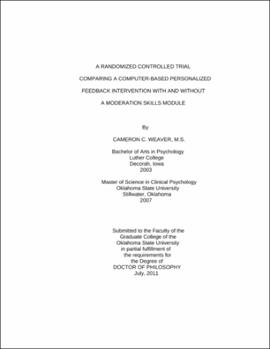| dc.contributor.advisor | Leffingwell, Thad R. | |
| dc.contributor.author | Weaver, Cameron C. | |
| dc.date.accessioned | 2013-11-26T08:27:47Z | |
| dc.date.available | 2013-11-26T08:27:47Z | |
| dc.date.issued | 2011-07 | |
| dc.identifier.uri | https://hdl.handle.net/11244/6985 | |
| dc.description.abstract | Scope and Method of Study: | |
| dc.description.abstract | Personalized Feedback Interventions (PFI's) have been supported in the literature for their effectiveness in reducing alcohol consumption and related consequences for college students. More recently, these interventions have been adapted to computer-based programs designed to disseminate these interventions a great number of individuals while limiting reliance on trained interventionists. While some of these PFI's include skills for moderating use, others have not included such modules. Both forms of the intervention have been shown to be effective. To date, there has not been a study to systematically examine the unique, or additive, contribution of skills modules. The current study sought to replicate and extend previous research on a computer-based PFI in order to test the utility of moderations skills (MS) modules. One hundred and fourteen participants were randomly assigned to an assessment only, a PFI, a PFI plus MS, or a MS only condition. Consumption and consequences variables were obtained at baseline and at one month follow-up. It was hypothesized that participants receiving PFI or PFI plus MS would demonstrate significantly greater reductions in alcohol use and related consequences compared to assessment only control groups, and that participants completing PFI plus MS would demonstrate significantly greater reductions in alcohol use and related consequences than all other groups. | |
| dc.description.abstract | Findings and Conclusions: | |
| dc.description.abstract | Results from the current study failed to support the utility of MS when combined with PFI's. Further, no significant interactions of time and condition were observed for any of the outcome variables. Results from the current investigation should be interpreted with caution given the small sample size and statistical power. Implications and future directions are discussed. | |
| dc.format | application/pdf | |
| dc.language | en_US | |
| dc.rights | Copyright is held by the author who has granted the Oklahoma State University Library the non-exclusive right to share this material in its institutional repository. Contact Digital Library Services at lib-dls@okstate.edu or 405-744-9161 for the permission policy on the use, reproduction or distribution of this material. | |
| dc.title | Randomized controlled trial comparing a computer-based personalized feedback intervention with and without a moderation skills module | |
| dc.contributor.committeeMember | Mullins, Larry L. | |
| dc.contributor.committeeMember | Wingate, LaRicka R. | |
| dc.contributor.committeeMember | Mason, Marlys | |
| osu.filename | Weaver_okstate_0664D_11595.pdf | |
| osu.accesstype | Open Access | |
| dc.type.genre | Dissertation | |
| dc.type.material | Text | |
| dc.subject.keywords | alcohol abuse | |
| dc.subject.keywords | college students | |
| dc.subject.keywords | computer interventions | |
| dc.subject.keywords | moderation skills | |
| dc.subject.keywords | personalized feedback interventions | |
| thesis.degree.discipline | Clinical Psychology | |
| thesis.degree.grantor | Oklahoma State University | |
